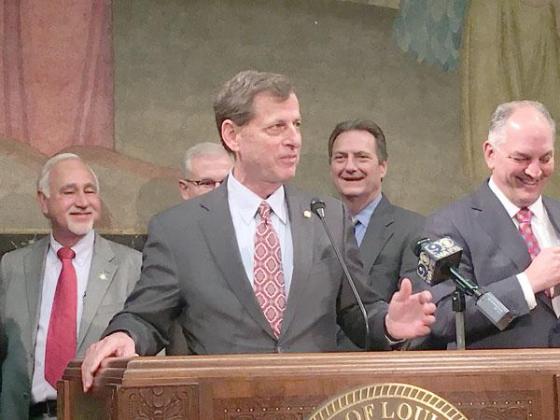
Katie Gagliano/Manship School News Service
The Justice Reinvestment Task Force has unanimously adopted recommendations to reform the state’s criminal justice system, advancing a program that proponents say could save taxpayers roughly $150 million and reduce the prison population by 13 percent within 10 years.
The recommendations, among others, called for adjusting penalties to lessen prison time for low-level offenders and investing nearly $154 million of criminal justice savings in re-entry programs to reduce recidivism rates.
Gov. John Bel Edwards asked the task force Thursday for smarter state policies that will improve community safety while investing taxpayer money more wisely. The state spends roughly $660 million on the corrections system annually, he said, a significant sum given the state’s recurring structural budget deficit.
“If we can’t afford it, and it’s not working, let’s do something better.”
Responsibility for advancing the proposals now falls to state legislators, who will convene April 10. Task force member, Walt Leger, a state representative from New Orleans, is expected to introduce the recommendation as part of a legislative reform package, including a bill mandating data collection and outcome tracking on the reforms.
Edwards said the task force’s strong bipartisan support is an encouraging foundation for the upcoming session, and policies focused on spending less money while reducing crime and improving communities is a win-win situation that Independents, Democrats and Republicans can rally around.
Despite optimism about the proposals, the governor and task force members were pragmatic about the road ahead. Leger warned that adoption of the recommendations is only a first step.
Some of the task force recommendations have been delayed. Of the task force’s 26 recommendations, 21 received unanimous task force support while five were contested by the Louisiana District Attorneys Association and victims’ advocates.
The recommendations that attracted pushback called for parole opportunities for violent offenders and limited application of mandatory minimum sentences and habitual offender penalties. Edwards said such opposition shows there is still more work to do.
The approach to violent offender parole will likely become a contentious point in Legislature that opens April 10, proposals supporting re-entry programs were more warmly received.
Following testimony from program representatives, task force members unanimously endorsed the Louisiana Prisoner Reentry Initiative as the package’s official reentry program.
Louisiana’s per capita incarceration rate — 816 people per 100,000 residents — is the highest in the country, and double the national average. Of the state’s roughly 36,000 prisoners, 40 percent are housed in local prisons in Caddo, East Baton Rouge, Jefferson, Orleans and St. Tammany parishes.
Cline Jenkins, co-chair of the St. Tammany LA-PRI steering team, said these parish jails often lack the vocational, mental health and rehabilitation services needed to properly prepare inmates for reentry into society. As a result, he noted, inmates re-enter the community without structured support systems and often revert to criminal behavior.
“What they face in the community is a closed door,” Jenkins said. “Former prisoners know that they’re going to carry what they refer to as ‘their jacket’ for the rest of their life. They will never be relieved of the prejudice and they will never be relieved of the invisible sentence.”
Providing these services and strong community support systems will significantly reduce recidivism rates, he said, which in turn financially benefits the state. For every 10 percent reduction in recidivism the state can realize $3 million in savings in incarceration fees and collateral community costs, Jenkins said.
LA-PRI is working to reduce recidivism rates through individualized case management for inmates and parolees as part of its pilot program, said Anne Kungel, community coordinator for the St. Tammany Parish LA-PRI steering team. These personalized risk plans assess needs and recidivism risks at critical points as the prisoner moves throughout the system, she said.
Edwards’ task force appointee, Foundation for Louisiana President Flozell Daniels, whose son was murdered in May 2016 in Orleans Parish, said evidence-based approaches like LA-PRI’s are what the state needs.
Daniels said reforming the criminal justice system allows the state to rediscover the humanity of people who have for a long time not been seen as human.
“I was thinking on the way here about (President Lyndon Johnson) addressing the country about the Civil Rights Act that he signed, saying ‘This work is about the dignity of man and the destiny of democracy.’ What we’re doing today is (nothing less) than an extension of that ethos.”
